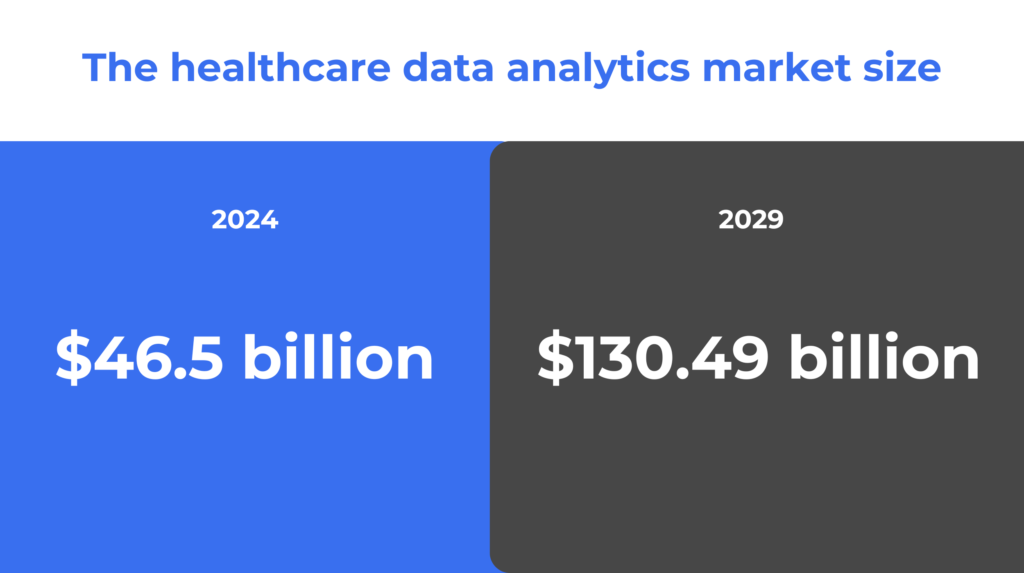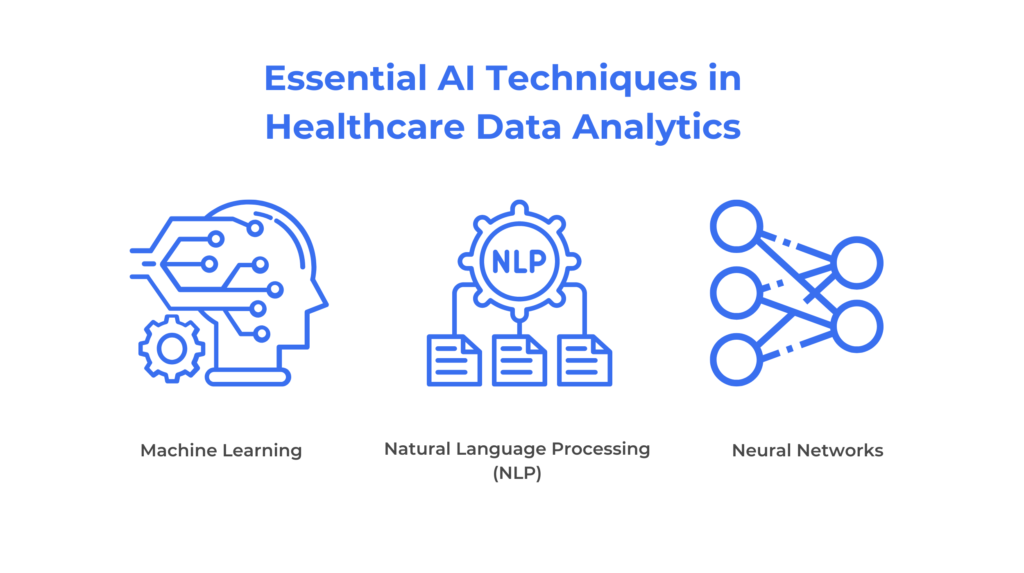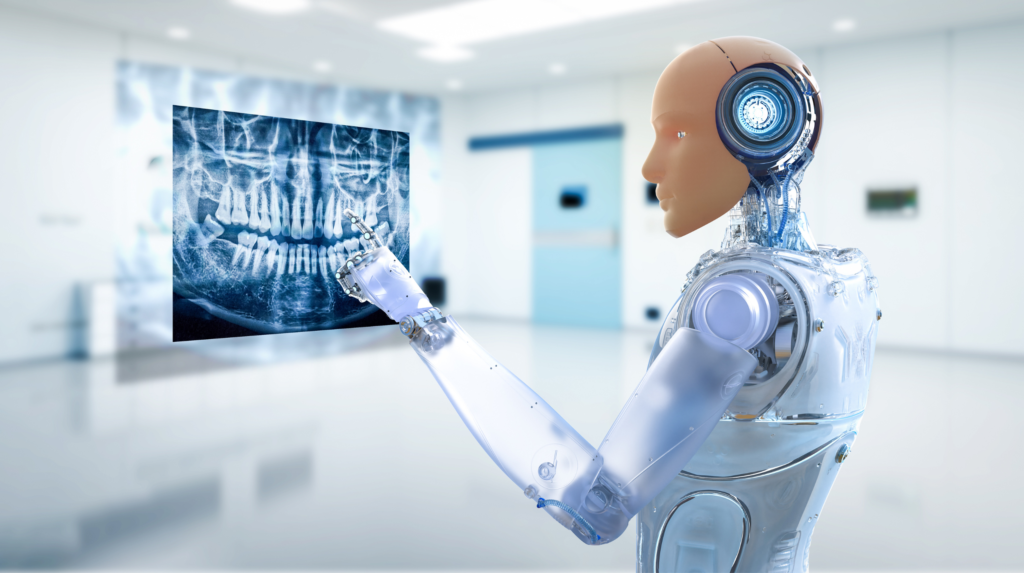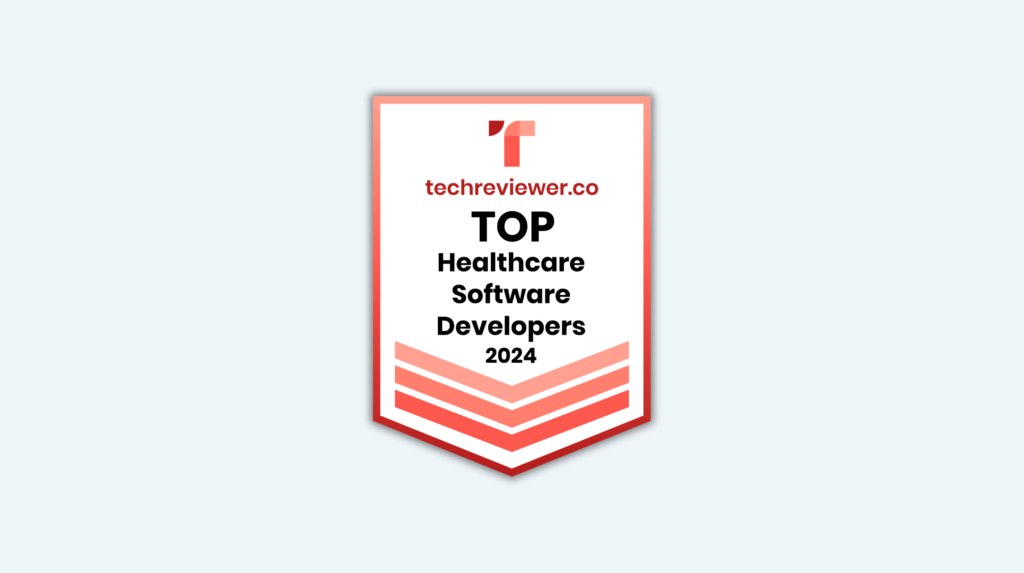Integrating data analytics in the healthcare industry is changing how medical professionals understand and use massive quantities of data. It allows healthcare providers to analyze patient data, treatment outcomes, and other crucial information to make more informed decisions. From enhancing patient care to streamlining operations, data analytics is critical to continue improving how healthcare works.
However, the healthcare industry produces an average of 50 petabytes of data each year, and as much as 97% of it is unused. The sheer volume of data generated daily can make it difficult for healthcare professionals to organize it into information they can use effectively. Fortunately, there is a growing trend of Artificial Intelligence (AI) integration to step in and address the challenges.
AI and data analytics in healthcare present a new frontier for the industry. AI-based solutions allow professionals to process and analyze massive datasets quickly and accurately, uncovering patterns and insights that might otherwise be impossible to identify for humans alone.
AI-powered data analytics is transforming healthcare by enabling more accurate diagnoses, personalized treatment plans, and efficient resource management. From predicting patient outcomes to optimizing hospital workflows, AI and data analytics work together to address some of the most pressing issues in healthcare.
What is Data Analytics in Healthcare?
Data analytics in healthcare involves the systematic examination of vast amounts of health-related data to extract meaningful insights that can inform decision-making and enhance patient care. This process encompasses the acquisition, management, analysis, and interpretation of data generated by healthcare activities. Utilizing both qualitative and quantitative techniques, data analytics transforms raw data into structured and actionable information.
In healthcare, data analytics plays a crucial role in identifying trends, assessing the effectiveness of treatments, predicting outcomes, and optimizing operational efficiency. By leveraging advanced tools and methodologies, healthcare providers can analyze patient records, diagnostic results, and administrative data to gain a comprehensive understanding of health patterns and improve clinical and operational processes.
Key components of healthcare data analytics include:
- Descriptive Analytics: Summarizes historical data to understand what has happened. It provides insights into trends and patterns from past data, helping healthcare providers to make informed decisions.
- Diagnostic Analytics: Focuses on understanding why certain outcomes occurred. It delves deeper into data to identify causes and correlations, providing explanations for observed trends.
- Predictive Analytics: Uses statistical models and machine learning techniques to predict future outcomes based on historical data. This type of analytics is valuable for anticipating patient needs, predicting disease outbreaks, and planning resources effectively.
- Prescriptive Analytics: Suggests actions based on the analysis of data. It provides recommendations for optimizing processes, improving patient care, and enhancing operational efficiency.
By applying these analytics techniques, healthcare organizations can convert vast amounts of complex data into actionable insights that drive better patient outcomes, streamline operations, and reduce costs. As the field of healthcare continues to evolve, data analytics will play an increasingly vital role in delivering high-quality, efficient, and personalized care.
The Growing Healthcare Data Analytics Market Size
The healthcare data analytics market is growing significantly thanks to the increasing integration of AI technology. As healthcare providers increasingly adopt data-driven decision-making tools, the demand for advanced analytics solutions continues to rise.

According to a recent Mordor Intelligence report, the healthcare data analytics market size is estimated to be $46.5 billion in 2024. It is expected to grow at a compound annual growth rate of 22.92% to reach $130.49 billion by 2029.
Healthcare Data Analytics Market Growth Predictions
Several factors are contributing to the rapid growth of the healthcare data analytics market:
- Integration of Big Data: The increasing use of big data in healthcare allows organizations to manage and analyze large volumes of data more effectively. This integration enhances the ability to draw actionable insights from complex datasets, improving patient care and operational efficiency.
- Need for Increased Efficiency: As healthcare providers strive to optimize their operations and reduce costs, the demand for advanced analytics solutions continues to grow. Data analytics helps streamline workflows, predict patient needs, and improve resource allocation, leading to significant cost savings.
- Adoption of Predictive and Prescriptive Analytics: The adoption of predictive and prescriptive analytics tools is on the rise, driven by their ability to forecast outcomes and provide actionable recommendations. These tools help healthcare organizations stay ahead of potential challenges, such as resource shortages and patient surges, by enabling proactive decision-making.
- Impact of COVID-19: The pandemic underscored the importance of real-time data analysis and predictive modeling in managing public health crises. Tools like the COVID-19 Index, developed by the National Minority Quality Forum, demonstrated how predictive analytics could aid in planning and resource management during outbreaks. This heightened awareness and adoption of analytics tools during the pandemic have continued to drive market growth.
The Role of AI and Data Analytics in Healthcare
AI and data analytics are working together to improve healthcare. AI can provide deeper insights into patient care and hospital operations by automating complex data processing tasks.
Traditionally, data analytics in healthcare involves manually sorting and interpreting data. While possible, this process can be inaccurate due to human error and take a lot of time.
AI excels at handling vast quantities of data much faster and more accurately, making it a powerful tool for healthcare providers. AI technologies such as machine learning and natural language processing can analyze vast amounts of structured and unstructured data from various sources.
For instance, AI can process medical images, EHRs, and genomic data to identify patterns that human analysts might miss. This capability allows AI to diagnose diseases, predict patient outcomes, and identify potential health risks.
The Key Techniques Used with AI in Healthcare Data Analytics
There are several ways in which AI can be employed to improve data analytics in healthcare, including:
- Machine Learning: Machine learning algorithms analyze historical data to make predictions or identify trends. For example, machine learning models can predict which patients are at higher risk for certain conditions based on their medical history and lifestyle factors.
- Natural Language Processing (NLP): NLP helps AI systems understand and process human language, enabling them to extract valuable information from unstructured data such as doctors’ notes, research papers, and patient feedback.
- Neural Networks: Neural networks mimic the human brain’s processing abilities to recognize patterns and make decisions. In healthcare, neural networks can analyze complex datasets like medical images and genetic sequences to provide insights into diseases and treatment outcomes.

AI enhances healthcare data analytics by making it more efficient, accurate, and insightful. This integration supports better clinical decision-making and improves patient outcomes and operational efficiency in healthcare organizations.
Predictive Analytics for Patient Outcomes
Predictive analytics uses historical data, machine learning algorithms, and statistical techniques to forecast future outcomes. In healthcare, it is utilized to predict patient readmissions, disease outbreaks, and treatment responses. For instance, hospitals can analyze patient histories and current health data to identify those at high risk of readmission, allowing for early interventions and personalized care plans to prevent unnecessary hospital visits
Clinical Decision Support Systems (CDSS)
Clinical Decision Support Systems use data analytics to provide healthcare professionals with evidence-based recommendations. By analyzing patient data and medical research, CDSS can suggest diagnoses, treatment options, and alert providers to potential drug interactions. This system enhances decision-making processes, reduces errors, and improves patient outcomes. For example, IBM Watson Health uses AI to assist oncologists in developing personalized cancer treatment plans by analyzing vast amounts of medical literature and patient data.
Population Health Management
Population health management involves analyzing health data from various sources to identify trends and improve health outcomes for specific groups. Data analytics helps healthcare providers track and manage the health of populations, identify high-risk groups, and implement targeted interventions. For instance, healthcare organizations can use analytics to monitor chronic disease prevalence, vaccination rates, and the effectiveness of public health initiatives, leading to better resource allocation and preventive care.
Achievion developed the Health Data Select Service, an AI-powered platform that streamlines data selection for healthcare providers.
The result was an AI-powered dataset analytics platform that delivered improvements in several key areas, including:
- A 29% increase in operational costs.
- 38% boost in productivity for the data analytics team.
- An anticipated 31% annual revenue growth.
This case study highlights the economic benefits of AI in healthcare data analytics, showcasing how automation and advanced analytics can drive efficiency and profitability in healthcare operations.
Healthcare dataset analytics platform
Operational Efficiency
Data analytics can significantly improve the operational efficiency of healthcare organizations. By analyzing data on patient flow, staffing levels, and resource utilization, healthcare providers can optimize their operations, reduce wait times, and improve patient satisfaction. For example, hospitals can use analytics to predict peak times for emergency departments and allocate staff accordingly, ensuring efficient use of resources and better patient care.
Personalized Medicine
Personalized medicine uses data analytics to tailor medical treatments to individual patients based on their genetic makeup, lifestyle, and other factors. By analyzing patient data, healthcare providers can develop personalized treatment plans that improve outcomes and reduce adverse reactions. For instance, genomics data can be analyzed to determine the most effective drug treatments for cancer patients, minimizing the trial-and-error approach and enhancing the efficacy of treatments.
Fraud Detection
Data analytics plays a crucial role in detecting and preventing healthcare fraud. By analyzing billing patterns and healthcare claims, analytics systems can identify unusual patterns and flag potential fraudulent activities. This helps healthcare organizations save significant amounts of money and ensures that resources are used appropriately. For example, data analytics can detect instances of overbilling or unnecessary procedures, prompting further investigation and corrective action.
Data analytics enables healthcare organizations to make data-driven decisions, improve patient care, and optimize operations. As technology advances, the scope and impact of data analytics in healthcare continue to grow, offering new opportunities for improving health outcomes and efficiency.
What are the Benefits of AI and Data Analytics in Healthcare?
AI and data analytics offer numerous benefits to healthcare, particularly in improving patient care, streamlining operations, and supporting medical research. Here are some ways they can contribute to improving the healthcare industry:
Enhanced Patient Care
AI-driven data analytics can analyze patient records and treatment histories to provide personalized care plans. This approach helps doctors identify the most effective treatments for each patient, leading to better health outcomes and fewer side effects. Predictive analytics can also alert healthcare providers to potential health issues before they become serious, allowing for early intervention.
Patient care process optimization with AI
Operational Efficiency
By analyzing hospital workflows and patient data, AI can optimize scheduling, reduce wait times, and improve resource allocation. For example, AI can predict patient admissions, enabling hospitals to manage staff and resources more effectively, which reduces costs and improves patient satisfaction.
Support for Medical Research
AI and data analytics accelerate medical research by quickly analyzing large datasets to identify trends and correlations. This capability speeds up the discovery of new treatments and drugs, leading to faster advancements in medical science.
Cost Reduction
AI-powered analytics can identify inefficiencies in healthcare processes, reducing operational costs. For instance, by predicting patient no-shows, AI helps clinics optimize appointment scheduling, reducing wasted time and resources.
Resource Optimization
AI systems can analyze data to optimize hospital resources such as beds, staff, and medical equipment. This ensures that resources are used effectively, minimizing waste and improving patient care.
Increased Revenue
AI and data analytics can enhance patient outcomes and satisfaction, leading to higher patient retention and increased revenue for healthcare providers. For example, AI-driven personalized care plans improve treatment success rates, attracting more patients to a healthcare facility.
What are the Challenges and Limitations of AI and Data Analytics in Healthcare?
Integrating AI and data analytics into healthcare does not come without its challenges.
Data Accuracy
The large quantities of raw healthcare data produced is diverse, which can also make it difficult to capture precise and meaningful insights. Accurate data is essential to build reliable AI models to help healthcare professionals make meaningful and informed decisions.
Issues like incomplete or erroneous data can compromise the reliability of AI-based data analytics results. Fragmented data sources and inconsistent formats across multiple systems and databases can make it more challenging to quantify all the data.
Inconsistencies in data monitoring by healthcare professionals and the unpredictable nature of data can result in duplicate records. These can affect the data quality that AI-powered platforms process. Healthcare data retrieved from various sources often lacks structure, which can also impact data integrity.
Integrating AI and data analytics in healthcare will require improving how data is collected. With far better data quality, AI-based models can be more successful in delivering accurate results.
Data Privacy and Security
Protecting patient data is a critical concern in healthcare. Integrating AI in healthcare data analytics requires access to extensive patient information, raising data privacy and security issues.
Compliance with the Health Insurance Portability and Accountability Act (HIPAA) and the General Data Protection Regulation (GDPR) is essential. Healthcare organizations must adopt robust cybersecurity measures and data encryption techniques to safeguard sensitive patient information.
Integration with Existing Systems
Many healthcare facilities face difficulties integrating new AI-driven analytics tools with their existing electronic health record (EHR) systems and other legacy infrastructures. Successful integration requires significant investment in technology and training. Ensuring that AI solutions work seamlessly with current systems is crucial for effective data analysis and decision-making.
Ethical Concerns with AI and Data Analytics in Healthcare
The use of AI in healthcare analytics involves ethical considerations such as patient consent and transparency in data usage. AI decision-making processes must be clear and understandable to maintain trust with patients. Addressing biases in AI algorithms is crucial to ensure fair and equitable treatment for all patient groups.
Bias in AI Models
AI models can inadvertently reflect and amplify existing biases present in the training data, leading to biased outcomes. Developing and training AI systems using diverse and representative datasets is essential to minimize biases and ensure that analytics tools provide fair results.
Regulatory Compliance
Navigating the complex regulatory landscape in healthcare is challenging. Regulations like GDPR and HIPAA impose strict requirements on data handling, patient privacy, and consent. Healthcare organizations must ensure that their AI and data analytics practices comply with these regulations to avoid legal issues and maintain patient trust.
Organizations can fully benefit from AI and data analytics in healthcare by addressing these challenges.
Trends in AI and Data Analytics in Healthcare
AI is transforming healthcare as we know it to revolutionize medicine completely. When it comes to data analytics in healthcare, there are a few key trends to keep an eye on, including:
1. AI for Determining Drug Effectiveness
AI is becoming instrumental in determining the effectiveness of drugs by analyzing vast datasets from clinical trials, electronic health records, and other sources. By predicting how different patients will respond to specific treatments, AI helps in tailoring therapies that are both effective and safe. This trend is particularly important in fields such as oncology, where treatment responses can vary widely among patients.
Achievion developed an AI-powered drug effectiveness prediction software for a pharmaceutical company specializing in oncology, gastroenterology, and neuroscience drugs. This software collects data from various sources, including company R&D departments, observational studies, EHRs, hospitals, and public databases. Using advanced machine learning algorithms, the software can predict drug effectiveness and suggest alternative clinical trial approaches in case of poor outcomes.
This significantly enhances patient safety and the reliability of medical interventions. By accurately predicting drug effectiveness, the software ensures that patients receive the most effective and safe treatments available, transforming the landscape of drug development and patient care.
2. Shifting Focus to Preventive Care with Predictive Analytics
The shift toward preventive care is gaining momentum in healthcare, largely thanks to predictive analytics powered by AI. Instead of merely reacting to illnesses as they occur, healthcare providers now leverage AI to predict potential health issues before they manifest. Predictive analytics involves analyzing vast datasets, including patient histories, genetic information, and lifestyle factors, to identify individuals at risk for specific conditions. For example, AI algorithms can predict the likelihood of developing chronic diseases such as diabetes or heart disease based on a patient’s current health metrics and history.
An excellent example of this trend is the work being done by IBM Watson Health, which uses AI to predict patient outcomes and assist in preventive care planning. By identifying at-risk patients early, healthcare providers can intervene sooner, offering lifestyle changes, medications, or other preventive measures to mitigate health risks.
3. Real-Time Monitoring and Remote Care
Real-time monitoring and remote care have become increasingly important, especially with the growing demand for telemedicine. AI plays a crucial role in this trend by enabling continuous monitoring of patients through wearable devices and remote sensors. These devices collect real-time data on vital signs, activity levels, and other health metrics, which AI algorithms then analyze to detect abnormalities and provide actionable insights.
One notable example is the use of AI in remote monitoring for chronic disease management. Companies like Biofourmis use AI-powered platforms to monitor patients with heart failure remotely. The platform analyzes data from wearable devices to detect early signs of deterioration, allowing for timely interventions that can prevent hospitalizations.
4. Federated Learning
Federated learning is an emerging AI technique that addresses data privacy concerns by enabling machine learning models to be trained across decentralized data sources without transferring the data to a central server. This approach is particularly relevant in healthcare, where patient data is highly sensitive, and privacy is paramount.
A practical example of federated learning in healthcare is the collaboration between Google and various healthcare institutions to develop AI models for predicting health outcomes. Using federated learning, these institutions can train AI models on their local data while keeping patient information secure and private. This method allows for more accurate and robust models without compromising data privacy.
5. Securing Data with Blockchain Technology
Blockchain technology is increasingly being used to secure healthcare data, providing a transparent and immutable ledger for storing patient records. When combined with AI, blockchain can enhance data security while also facilitating more efficient data sharing and analysis.
For instance, companies like Medicalchain use blockchain to secure electronic health records (EHRs). AI, in this context, allows for more sophisticated analysis of blockchain-secured data, ensuring that only authorized individuals can access and manipulate the data. This combination of AI and blockchain is particularly valuable in preventing data breaches and ensuring compliance with regulations like HIPAA.
6. Integrating Social Determinants of Health (SDOH) for Comprehensive Insights
AI is increasingly being used to incorporate Social Determinants of Health (SDOH) into healthcare decision-making. SDOH factors, such as socioeconomic status, education, neighborhood, and physical environment, significantly influence patient health outcomes. By integrating SDOH data into EHRs and analyzing it with AI, healthcare providers can better understand a patient’s health risks and needs.
Kaiser Permanente, for example, uses AI to analyze SDOH data alongside traditional clinical data to identify high-risk patients and develop targeted interventions. By considering factors such as housing stability, income, and access to food, AI helps create more personalized and effective care plans that address the root causes of health disparities.
7. Personalizing Insurance Models for Enhanced Customer Satisfaction
AI is also transforming the insurance industry by enabling more personalized insurance models. By analyzing individual health data, lifestyle factors, and even genetic information, AI can help insurers develop tailored insurance plans that better meet their customers’ needs. This personalization improves customer satisfaction and encourages healthier behaviors by aligning insurance premiums with individual health risks.
For instance, Oscar Health uses AI to offer personalized health insurance plans that consider a customer’s specific health needs and lifestyle. AI-driven analytics allow Oscar to offer customized recommendations and wellness programs, improving overall customer engagement and satisfaction.
These trends highlight the transformative potential of AI in healthcare, from preventive care and real-time monitoring to personalized insurance models and secure data management.
Unlock The Power of AI-Enhanced Data Analytics in Healthcare With Achievion
By leveraging AI and data analytics, healthcare organizations can enhance patient care, optimize operations, and achieve substantial cost savings, ultimately leading to a more efficient and effective healthcare system. Get in touch with Achievion today to learn how we can help you build an intelligent and efficient AI-powered solution for data analytics in healthcare tailored to your needs.









